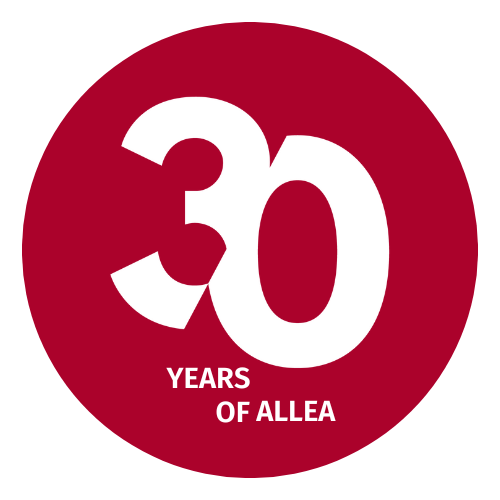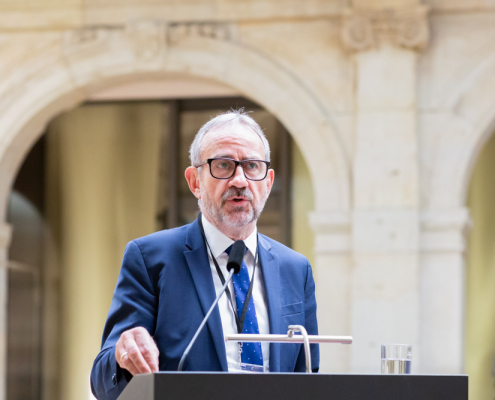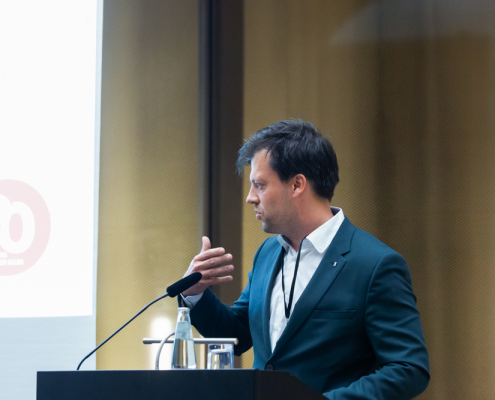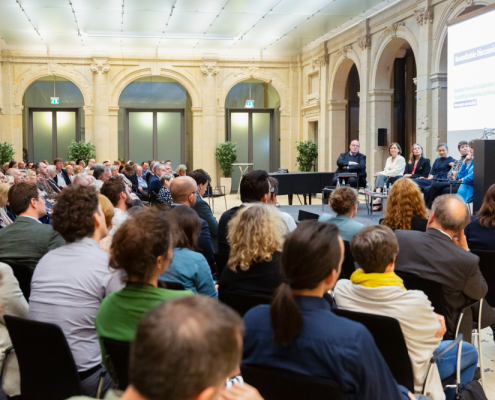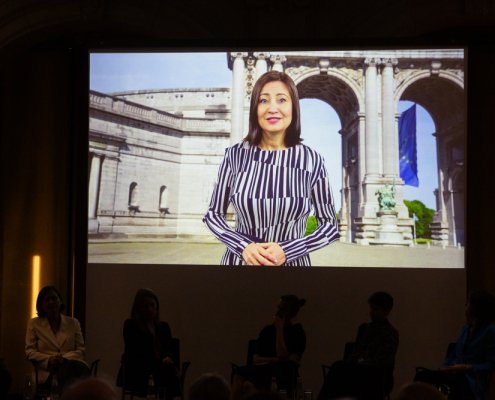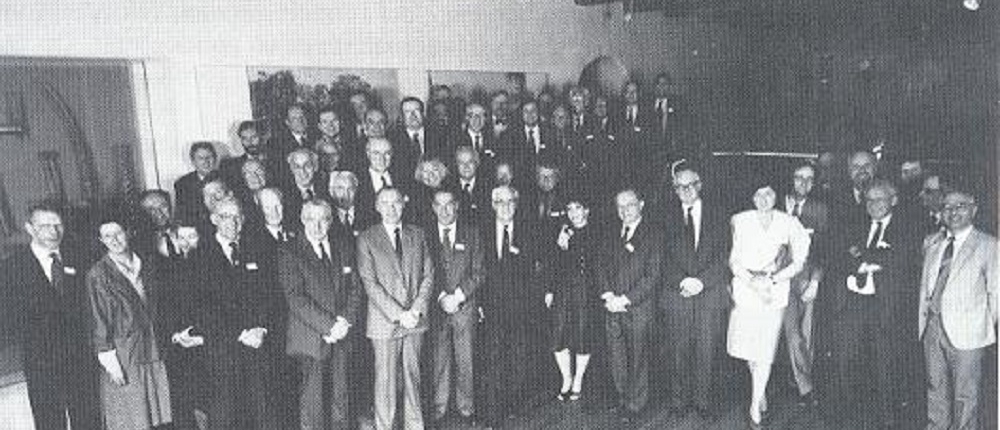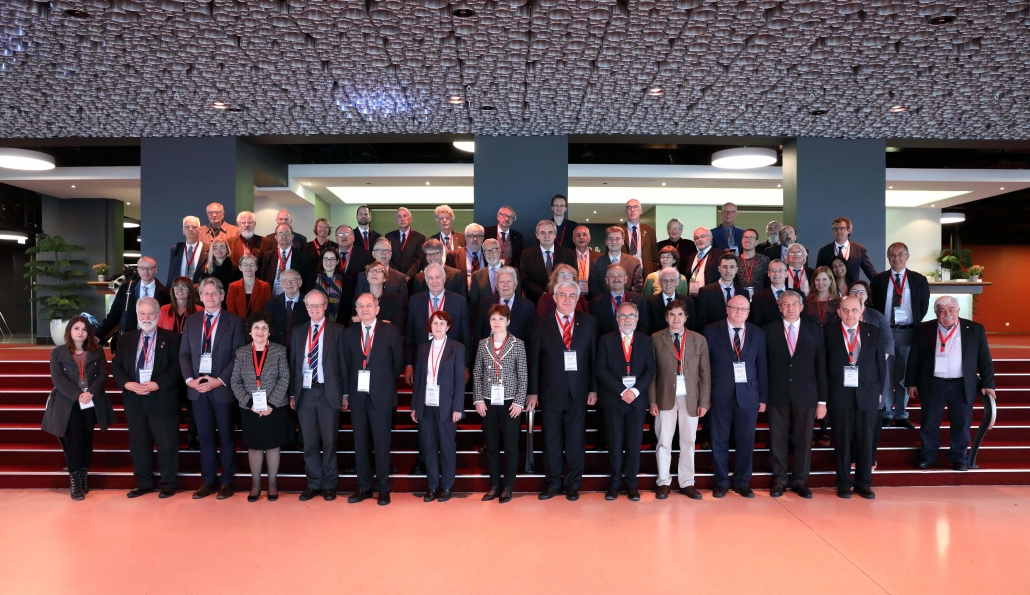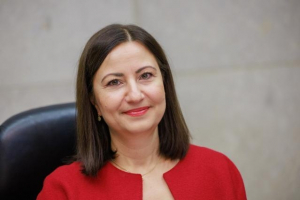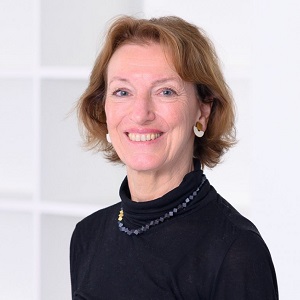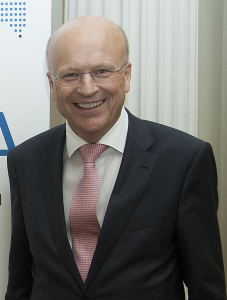History of ALLEA
ALLEA 30th Anniversary Celebration, Berlin, 22 May 2024
On 22 May 2024, ALLEA celebrated its 30th anniversary during its annual general assembly in Berlin. The festivities honoured three decades of international and interdisciplinary academy collaboration. The programme included opening remarks by Antonio Loprieno (ALLEA President), a video address by Iliana Ivanova (European Commissioner for Innovation, Research, Culture, Education and Youth), and congratulatory addresses by Henry Marx (Berlin State Secretary for Higher Education and Research) and Hermann Parzinger (Prussian Cultural Heritage Foundation).
Hermann Parzinger’s speech during ALLEA’s 30th anniversary celebration was an engaging tribute to the organisation’s legacy. He highlighted ALLEA’s pivotal role in fostering scientific cooperation across Europe and its resilience amidst contemporary challenges. Parzinger’s personal anecdotes and reflections underscored the enduring importance of ALLEA’s mission, making his address a memorable part of the festivities.
Read it below or download it here.
Read Hermann Parzinger’s Speech
Dear Antonio Loprieno, dear Christoph Markschies, dear Presidents of the Member Academies of ALLEA, ladies and gentlemen,
ALLEA is one of the miracles of the early 1990s, the ‘All European Academies’, or the ‘European Federation of Academies of Sciences and Humanities’. In the meantime, it is a unique network of 58 Academies from 40 European countries, from Albania to the Vatican or – in its geographical dimension – from Norway and Portugal to Turkey and Georgia. ALLEA is including the whole of Europe, the Europe of the Council of Europe, not only the Europe of the EU. And of course – since 2022 – minus Russia and Belarus, which was a difficult but unavoidable decision, and ALLEA has endured that decision.
When founded in 1994, this was not only 30 years ago. It was another Europe, the Europe after the fall of the Iron Curtain, and there was a need for such a network of Academies: for fostering cooperation in the field of research, for networking, for promoting the role and importance of Europe’s Academies of Sciences for a peaceful and prosperous development of our continent, and for addressing evolving challenges of our societies.
Concerning these years around 1994, when ALLEA was founded, please let me add some personal experiences from my own field of research and from my own career. I am an archaeologist (pre-historian), and from 1990 on, I was Deputy Director of a department of the German Archaeological Institute in Frankfurt. There, my main task was to establish research cooperations with Eastern European countries, when the Iron Curtain was collapsing, and the focus was on Eastern Central Europe and the Balkans.
Since I was student, in the beginning of the 1980s, and studying in Munich University, I was interested in Eastern Europe. Maybe it attracted me because it was not so easy to go there. Meanwhile my fellow students took a study year in Cambridge or Oxford, I thought that this was not the right direction at least for my scientific interests. I learned Czech, Slovenian, Serbian, and Russian because archaeologists at that time – and still today – published and publish mostly in their own language: Germans in German, Bulgarians in Bulgarian, Hungarians in Hungarian, and so on. I originally was to spend a study year in former Leningrad, everything was prepared, but then it turned out to take too much of my time for waiting. So, I learned Slovenian and went to Ljubljana in Slovenia.
Almost 10 years later and exactly in that ‘ALLEA-year’ 1994, I became Founding Director of a new department of the German Archaeological Institute, the so-called Department for Eurasian Studies in Berlin for starting archaeological research in the former Soviet Union. We started projects in Ukraine, Russia, Georgia, Uzbekistan and in other new and independent states of the former USSR, as well as in Mongolia and China.
These were real years of new beginnings, years of new possibilities that we would never have dared to dream of, taking into account the difficult history between Germany and Russia in the 20th century. After 1945, the Soviet Union was an almost inaccessible country for field research, and now travelling, surveying, and excavating in the most remote corners of Siberia and Central Asia became possible! We have been studying the prehistoric metal supply (copper and especially tin) of the Old World from Uzbekistan, Kazakhstan und Tadzhikistan. We have been following the tracks of the earliest equestrian nomads from the 1st millennium BC, the so-called Scythians, discovering one of the richest graves of a Scythian king (with almost 6,000 golden objects), and selling it to the media in both countries saying that only international cooperation can achieve such outstanding success. A few years later we were excavating the mummy of a Scythian warrior with a German-Russian-Mongolian team in the permafrost region of the High Altay Mountains, and the German team was invited by the Russians to take part in Mongolia.
This ongoing field research for almost 30 years was combined with an intensive scientific exchange of students, young researchers, and experienced professors through fellowship programmes in both directions. Young Germans learning Russian, and young Russians learning German, reflecting the different research traditions in both countries, which was crucial for a better and respectful understanding of each other’s approaches and attitudes. I personally was regularly teaching in Novosibirsk University until 2018. What happy times!
I could go on talking about these exceptional years, exceptional decades, decades of harmony and full of opportunities and possibilities, which we have utilised. For me it was impressive proof of the power and opportunities of open and trustful scientific cooperation between research institutions. And this also underlines the enormous potential of ALLEA, and that is more necessary today than ever.
My personal scientific life during the last 40 years, even long before 1994, was a constant move between East and West. Today, I am a member of Academies of Sciences and Humanities not only in Germany (BBAW and Leopoldina), but also in Western Europe (Real Academia in Spain, British Academy in Great Britain) as well as in the East of our continent (Romania, Russia, and recently Georgia), in addition to China (Chinese Academy of Social Sciences) and the USA (American Academy of Arts and Sciences, American Philosophical Society). The differences in the Academies in the West and in the East was obvious before the 1990s. In the West, Academies were and still are more a kind of ‘learned societies’, meanwhile in the Soviet world in the Eastern part of Europe, the Academies were the backbones of scientific research and much more important than Universities. Since then, this has changed in the East (including Russia), and Eastern Academies have become closer to their western counterparts, or are a kind of hybrid between Academies of Soviet style and learned societies of Western type.
This Europe in a way – more or less – existed still in 2019, when ALLEA had its 25th anniversary. Interesting are some of the quotes for this jubilee: “ALLEA is crucial for democratic decision-making and for safeguarding our values”, “a flagbearer for research integrity and widely recognised standards”, “a mobiliser of the most impressive intellectual excellence of our continent”, and “a defender of fundamental values of academic life, of open culture and academic freedom”. But there were already some more concerned comments back then, in a way predicting upcoming challenges by underlining the importance of facts and values, of empirical evidence and democratic discourse, against intentional disinformation (“alternative facts”), and by highlighting the first risks for our society talking about climate change, energy supply or antibiotic resistance.
In these last five years since 2019, however, Europe and the world has changed radically. The pandemic (at least the pandemic was defeated by a great moment in science), the rise of extreme right-wing parties in too many European countries, including Germany, the new dimensions of fake news and disinformation in our societies, and at the same time the growing rejection of research and scientific results, the brutal aggression of Russia against Ukraine and the first extensive ongoing land war in Europe since 1945, and the changing role of Europe in the world, losing influence and being listened to less. Not talking about the increasingly worrying climate crisis and the not-ending migration movements from the Global South. All this brings new challenges for ALLEA, and ALLEA is needed now more than ever.
There are many challenges to talk about, and each of the mentioned ones could be the topic of a longer-lasting lecture. But as time is restricted, let me just address four of them.
Challenge 1: We need more European integration
How can we make Europe stronger? Science and research, as well as culture, can play a crucial role. My organisation, the Prussian Cultural Heritage Foundation, stands for both. It is one of the largest cultural institutions worldwide, a memory organisation including museums, libraries, archives, and research institutes, and it acts at the interface of art, culture, and heritage on one side and science and research on the other side.
Since some years, I am Executive President of Europa Nostra as an honorary duty. Europa Nostra is an NGO, the Europe-wide network of professionals, organisations, and civil society dedicated to protecting and celebrating Europe’s cultural and natural heritage. We are the voice of all who believe that cultural heritage is vital for our economy, our society, our culture, our environment, our well-being and for the future of Europe. We act as advocates of heritage towards policymakers at all levels of governance. We campaign to save threatened heritage sites through special programmes, and we promote excellence through the European Heritage Awards/Europa Nostra Awards on behalf of the EU.
Man cannot exist without history. Heritage plays an important role for the collective memory, which always has been constructed by selected aspects from the past, and that memory of the past becomes a social phenomenon too. Cultural heritage therefore is crucial for Europe today. Heritage provides considerable benefits for society, environment and economy; the cultural heritage of Europe is the cultural heritage that all Europeans share, it is the visible expression of our common European culture and history, it is uniting past, present and future, it is our shared heritage, which gives a sense of belonging! Cultural heritage is a decisive element of our local, regional, national, und European identity, and therefore it is a cohesive factor for European integration. In short, cultural heritage is one of the most dynamic forces to shape Europe and a European consciousness.
What Europa Nostra is for the cultural heritage sector, is ALLEA for science and research. I believe in the importance and power of a European research space for fostering European integration! It’s exactly like in the cultural world, Europe is ‘unity in plurality’, and this unique selling point has to be made strong in the academic sector too, and it should be a strategic priority of ALLEA!
Challenge 2: We need more trust in science and research
ALLEA is very active in the dialogue between science and society with a lot of initiatives, just mentioning the ‘Fact or Fake’ discussion paper, or the activities in science education and the ‘Ethics in Science Education’ statement. ALLEA’s European Code of Conduct for Research Integrity is crucial in that context too. It is one of the most authoritative guidelines outlining how researchers should conduct their work, it is widely respected as it is a reference document for all Horizon Europe-funded research grants. As there exist various national Codes of Conducts in Europe, the process of extensive and thorough consultation procedures with the wider scientific community and stakeholders from corporate and civil society sectors was a real role model.
But for gaining trust in society, science and research must be free and independent. The absolute freedom of research is not negotiable! It may be tempting for certain political leaders to reduce and restrict this freedom, and we can see such tendencies especially in extreme right-wing parties, but again: this freedom is non-negotiable! ALLEA is fighting for it, for example, as a member of the EP Forum for Academic Freedom. And we can raise our voice self-confidently: very recently there was an inquiry about the role of museums in German society. The result was surprising: there is an enormous social trust in museums as places that offer reliable information and knowledge. Especially in a world of multiple information sources and an uncontrollable dominance of social media, people can no longer assess. So there obviously is a growing tendency towards trust and belief in ‘classical’ institutions. Maybe museums and academies have one thing in common: for those who do not know much about them, they may seem to be a bit old-fashioned. But if we know how to address society, the long tradition of our existence can provide us with potential, which we have to activate in the most modern way.
Challenge 3: We need to strengthen Europe in the global competition
Europe is a unique space of science and research. In no other part of the world do we have a comparable density of academies, universities, non-university research institutes, memory institutions, and so on. But how do we utilise this strength in the global competition?
In Germany, already years ago, the importance of Foreign Science Policy was recognised. ‘Foreign Science Policy’ and ‘Foreign Cultural and Educational Policy’ are closely connected. Both have always been important columns for our Foreign Policy, but to be frank: sometimes more and sometimes less. But we have to be aware about the global competition, especially with regard to the Global South. China and Russia are extremely active in that part of the world, somehow using the argument of fighting together with the Global South against Western dominance in a post-colonial period. We all know that this is not a selfless attitude, and their policy in the Global South is driven by strong and very clear interests as well.
But what is Europe’s answer? I know that the EU has strategic considerations in this respect, but what is the position of ALLEA? I am convinced that we have to address this challenge, and that we only can make it together. Germany in my eyes is maybe not taking the best possible way by reducing the funding for important actors of Foreign Science and Foreign Cultural and Educational Policy, such as the German Academic Exchange Service, the Alexander von Humboldt Foundation, and Goethe Institute. We should do exactly the opposite and invest in creating strong ties with our international partners, especially – but not only – in the Global South. Europe and European countries must be an attractive partner for cooperation and exchange!
Challenge 4: The war in Ukraine
A deep crisis was caused by the terrible and devastatingly brutal Russian attack against Ukraine. Nobody knows when this will end, and how it will end, but ALLEA can develop a strategy to strengthen and rebuild Ukrainian scientific institutions and bringing them closer to Europe, and advising the EU in this process. At the moment, in the upcoming next ‘Ukrainian Recovery Conference’ in June 2024 in Berlin, culture and heritage are missing, as well as science and research, although they are so important because we can and should support these sectors already now!
Another challenge will be – once there is peace again – how to incorporate again Russian Academy of Sciences and the scientific institutions of this country. It will be another challenge for ALLEA because ALLEA was especially founded for building bridges between West and East. And I am convinced that ALLEA will accept the challenge then!
At this moment, this is beyond my imagination, maybe it will take decades until this can happen, and all depends of course on how this war will end up. The way it ends will raise options for how to continue in future. But we should not forget: German Academies and scientific institutions after 1945 also succeeded in again becoming internationally integrated, although in its respective Western and Eastern blocs. But it of course needed a complete change of the country into a democratic state and society.
Coming to the end
A lot could still be said because there are much more and very diverse challenges. Europe and the world have fundamentally changed since the 25th anniversary of ALLEA. The former Spanish Prime Minister Felipe González once said: The great steps forward, Europe only did after moments of deep crisis. If this is true, we can expect a gigantic step forward.
But one thing is also clear: If ALLEA did not exist today, we would have to create it. Because we need networks like ALLEA now more than ever!
Happy birthday and thank you for your attention!
Hermann Parzinger
Looking Back on Our History
The idea of establishing a network of European academies like ALLEA goes back to an initiative of the Royal Academies of the Netherlands and Sweden in the year 1990. New opportunities for co-operation between European countries arose after the end of the Cold War and the process of the European Union integration strongly affected the areas of science and higher education. An exploratory meeting among interested academies was held in Amsterdam in April 1990, where issues such as the advisory functions of academies, increasing communication and information sharing between academies, and the fostering of scientific and scholarly cooperation in Europe were discussed.
A subsequent meeting in Stockholm in March 1992, convened representatives from more than 30 Academies, from almost as many countries from all over Europe to discuss the possibility of establishing a confederation of learned societies to address the growing need for scientific advisory arrangements at the European level and to facilitate and promote cross-border cooperation amongst the European academies.
A third and final constituting meeting was held in Paris on 22-23 March 1994, where ALLEA was officially established as the European Federation of Academies of Sciences and Humanities, following the idea that Academies working together across Europe is more than the sum of its parts.
Representatives of 30 European academies of sciences meet for the first time at the KNAW in Amsterdam on 6 April 1990.
ALLEA academies’ representatives at the 25th Anniversary hosted by the Swiss Academies of Arts and Sciences in Bern on 9 May 2019. Credit: Eric Schmid
30 Years of Historical Milestones
ALLEA was established under the precept that the whole is more than the sum of the parts
Congratulatory Messages on our 30th Anniversary
Iliana Ivanova, European Commissioner for Innovation, Research, Culture, Education and Youth
“As we commemorate both the 30th anniversary of ALLEA and the 40th anniversary of the EU framework programmes for research and innovation this year, we stand on the shoulders of those visionaries who recognised the profound value of pan-European cooperation in science and humanities.
This is a moment to celebrate the crucial contribution of ALLEA and its member academies to enhancing international research collaboration through the European Research Area and other policies and initiatives. Achievements such as the European Code of Conduct for Research Integrity that is now guiding Horizon Europe projects or ALLEA’s instrumental work underpinning the European Commission’s Scientific Advice Mechanism showcase the power of international cooperation.
Looking ahead, we need to keep reinforcing the role of science in society, reaching out to all talents and ideas across countries and disciplines, and laying the foundations of our future resilience in the face of global challenges.
Happy birthday, ALLEA – let’s continue building a legacy of scholarly unity and scientific cooperation for the benefits of Europe and beyond.”
Maria Leptin, President of the European Research Council (ERC)
“Congratulations to ALLEA on this milestone! You can proudly mark three decades of remarkable work for collaboration across Europe and its neighbourhood with over 50 Academies of the Sciences and Humanities as members. Rooted in the tradition of the Enlightenment, ALLEA has stood up for universal science across borders, be they geographical or disciplinary, and for academic freedom, which is more important than ever today. Whilst the ERC is only just over half your age, our two organisations share many values and strive towards similar goals, not least fostering excellence in research. We are grateful to ALLEA for its unwavering backing of the ERC and its dedication to advancing blue-sky research across all fields over the years. Here’s to many more years of fruitful collaboration and to scientific curiosity!”
Koen Lenaerts, President of the Court of Justice of the European Union
“ALLEA connects the talents present in Europe’s Academies of Sciences, sensu lato, being a bridge between cultures that have their own identity, yet respect and trust one another. It is this bridge function that enables ALLEA to underpin the search for the common good with scientific insights shared by a large cross-section of Europe’s academic ‘force de frappe’. This role is essential to cope with the challenges ahead of us, such as how to consolidate a pluralistic, tolerant and inclusive democracy in a digital environment where facts and fakes are not readily distinguishable; or how to reorient economic development and technological innovation towards sustainable energy supply and, more generally, climate-saving objectives.
ALLEA’s work shows that science and policy choices are interdependent and that when Europe’s brightest join forces, Europe’s future looks bright indeed. Happy Thirtieth Anniversary, ALLEA, ad multos annos!”


